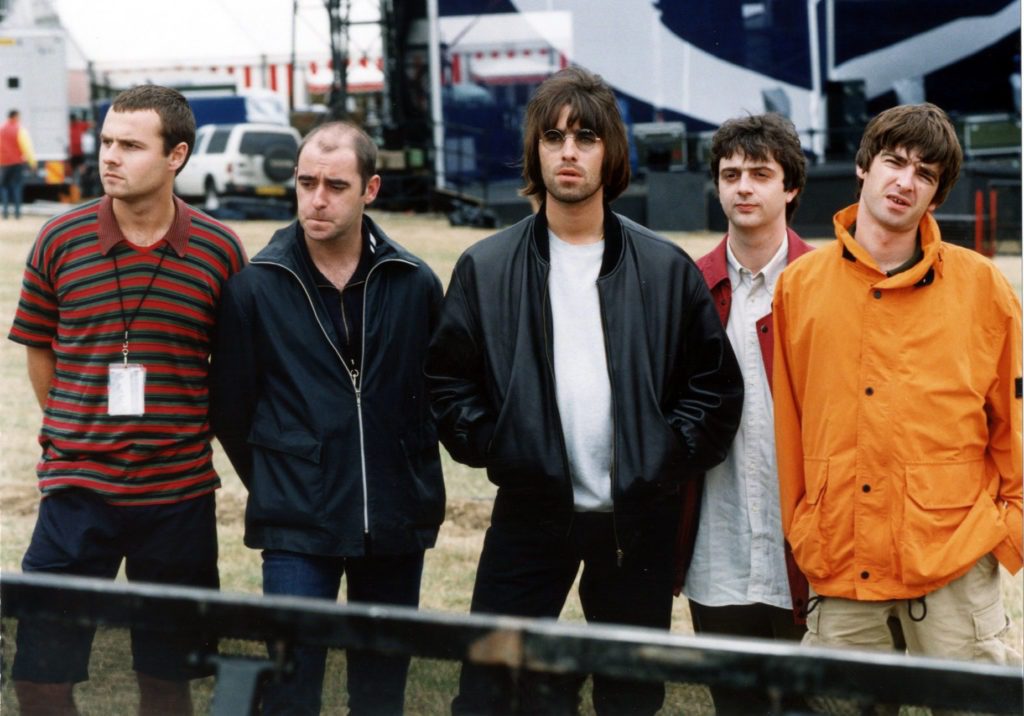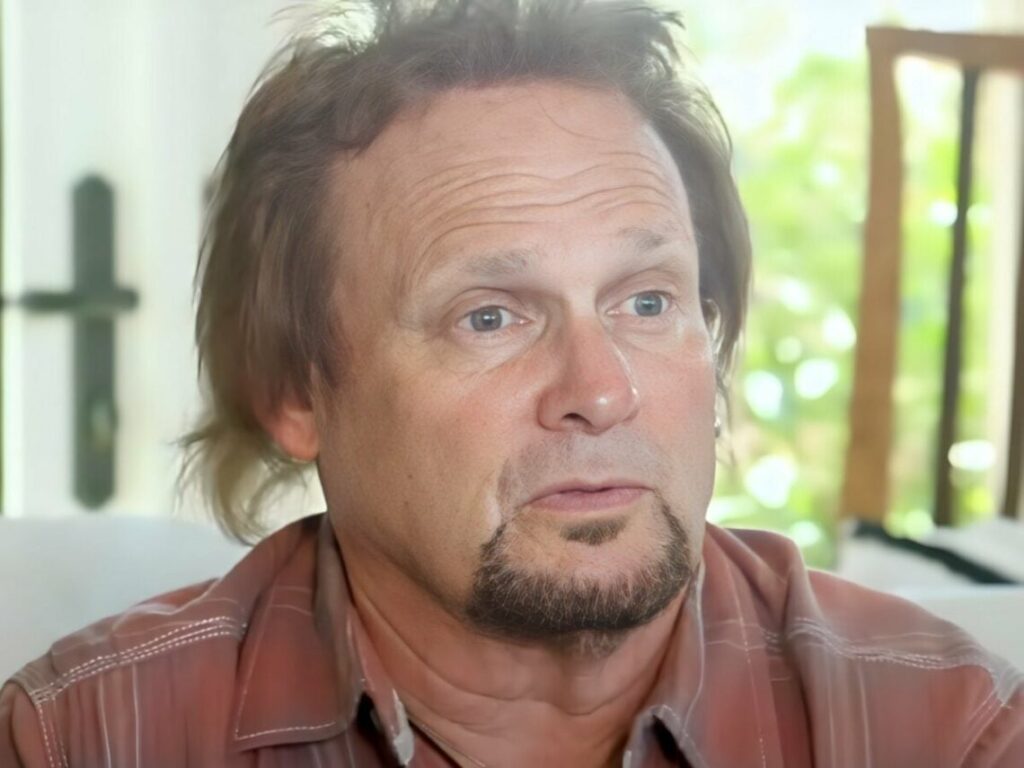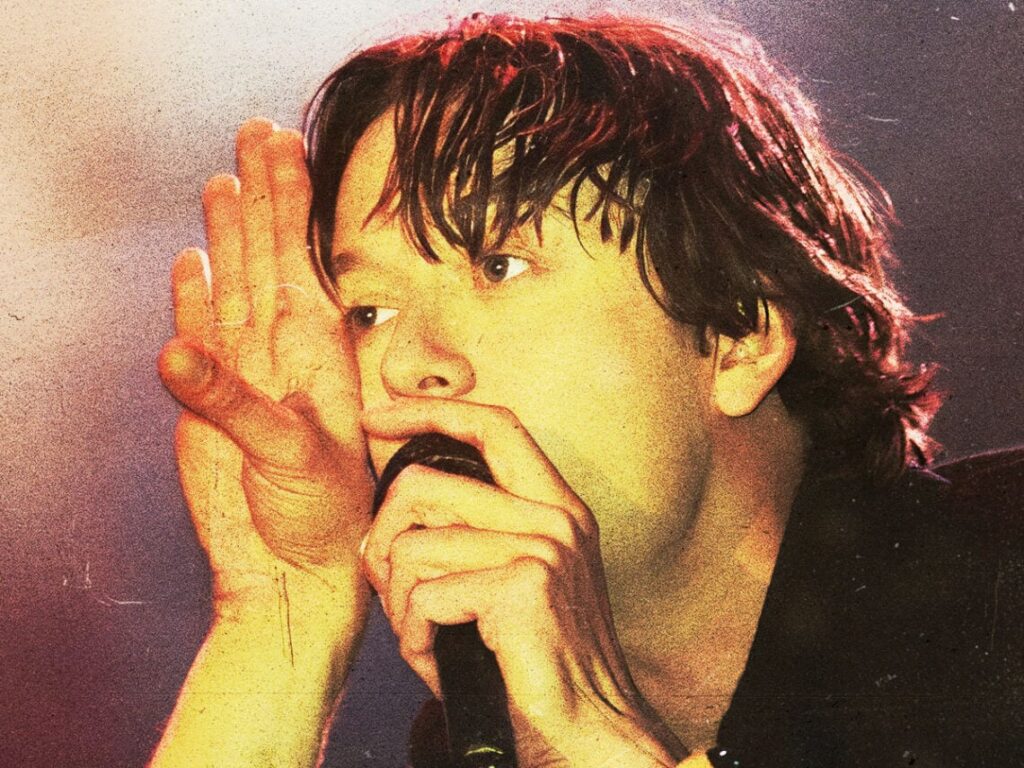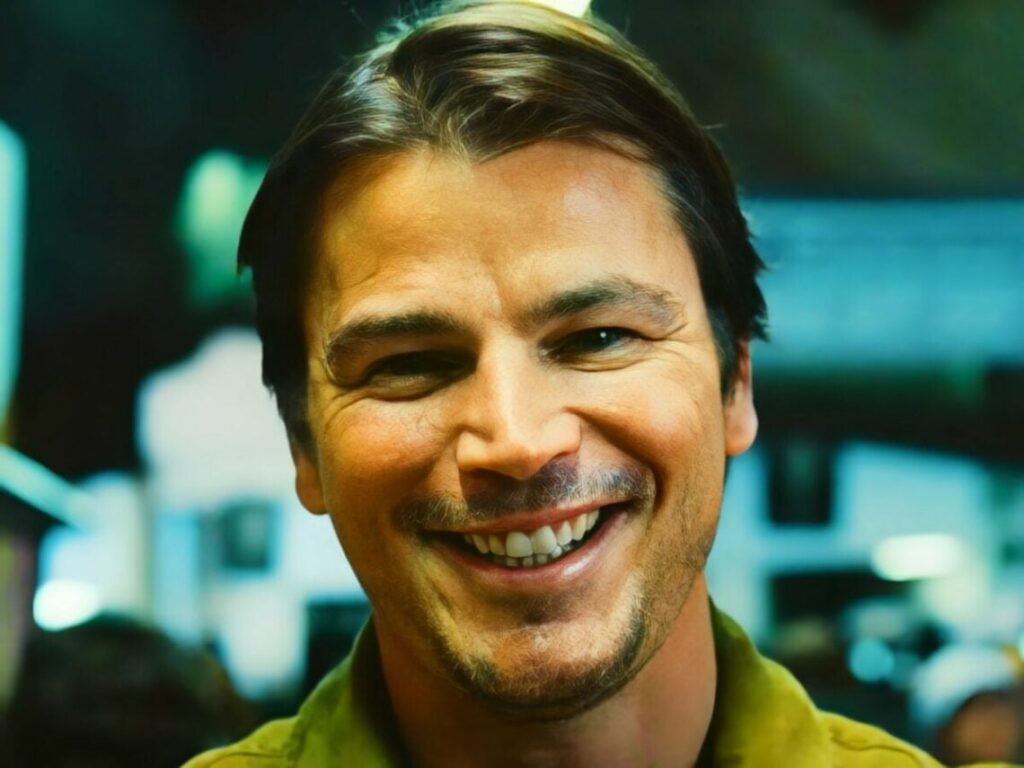Oasis: Looking Back on '(What's The Story) Morning Glory?' at 25
 Posted On
Posted On
Even in the midst of a world-wide lockdown due to a global pandemic, the mere hint of an Oasis reunion still makes headlines.
This month marks 25 years since Oasis released (What’s the Story) Morning Glory? – a record that became one of the biggest selling albums of all time, resonated around the world, and whose hearty songs (like “Wonderwall,” which recently passed 1 billion streams on Spotify) continue to find the Manchester, England band – more than a decade after their split – new fans.
To understand why, just drop the needle on the first of WTSMG’s four vinyl sides, hit play on the CD, queue up the cassette or just stream it on Spotify – and there it is, those timeless opening notes. No, not of the bombastic, let’s-bust-through-the-door-and-have-a-fookin’-party opening bluesy-rock feel of “Hello,” but those haunting, heart-tugging, quietly tender guitar strums from one rock’s greatest ballads – “Wonderwall” – teased briefly at the top.
“Because maybe, you’re gonna be the one that saves me . . .”
“Some songs hit big and stay with people because they are so specific, because they’re so personal and because everybody can relate to them. I think ‘Wonderwall’ is the opposite because who the hell knows what it’s about?” Gene “Bean” Baxter, one-half of legendary former KROQ morning program The Kevin and Bean Show tells SPIN down the phone line from the U.K., one evening. “I almost wonder if it’s a Rorschach test where you can just believe it’s about anything, you can just read anything you want into it. Like you have . . . I’ve heard that [song] 20,000 times in my life. Do you have any idea what it’s about?”
There are suggestions about that topic scattered across global internet servers still housing early Oasis interviews. Some believe it’s about Noel’s girlfriend at the time (Meg Matthews), others that it has something to do with a George Harrison film, and still others who think it has to do with an inspiring talk between Noel and an imaginary champion.
“Fuck—I actually don’t know,” Alan McGee, the Creation Records boss who discovered them at a tiny gig in Glasgow, Scotland, believed in them, and brought them to his UK label, tells SPIN. “No idea.”
What McGee did know when he heard that song – one of three that Noel sent the Scotsman on a tape after running into him in Central London sometime in early 1995, was that it was special.
“I knew with that song and the momentum the band had actually built up, that we were going to sell a lot of records. But I even got that wrong. I actually thought when I heard ‘Wonderwall,’ ‘God, we’re gonna sell 10 million!’ and we sold 23 million. I got it wrong,” he laughs.
According to people who keep track of these things, (What’s the Story) Morning Glory? is one of the biggest selling albums of all time, globally. And even newly-imposed social-distance guidelines issued by the British government couldn’t stop folks from commemorating the album’s silver anniversary – albeit from an appropriate distance – on Oct. 2nd.
“It means something to people. It does,” BBC 6 Music’s Matt Everitt, a graduate of mid-’90s indie-pop band [email protected], tells SPIN. “It’s being covered in the news and people are doing interviews about it and stuff like that.
“People still care. People still care,” he says earnestly. “Even if they haven’t heard the album for years, they know what that album made them feel like. It reminds them of certain moments in their life. It was the first time for many, many people that they’d seen a band on stage that were about their lives, singing to them … for them. It’s that football analogy again, Oasis were everyone’s team for a while – everybody’s favorite team and even if you go off football or whatever and you get busy in your life doing other things, that loyalty stays, I think.”
In Britain, WTSMG became massive – like blaring out of every shop/bedroom/pub/car window massive, spending 10 weeks at No. 1 in the UK charts, and eventually shifting 4.8 million LPs, making it, according to the Official Charts, Britain’s third best-selling album of all time.
“Please don’t put your life in the hands, of a rock ‘n’ roll band/We’ll throw it all away . . . “
Wisdom is supposed to be a benefit of age, no doubt due to a well-worn risk-assessment gauge. Youth, though – with or without the reckless past times afforded to it – produces an advantage usually broken down by time: fearlessness. Oasis embraced that. For Noel, that creative bravery (or, as some like to call it, that Oasis arrogance) came out in his songwriting. He had an ear for melody – his own, or borrowing unapologetically from his heroes in the pantheon of rock – and it came together quickly in an album that captured something a little familiar, a lot anthemic and so good it was otherworldly.
“The songs from that album … those are like Beatles songs,” Bean notes. “Those are songs that I feel like people are going to be listening to and singing in soccer stadiums in 100 years. I don’t think songs like that ever go away – especially, ‘Don’t Look Back [in Anger]’ and ‘Wonderwall.’ That’s in the great America songbook tradition, songs like that. And you don’t always know that at the time, but they certainly were exceptional records. They weren’t just pop hits. You could tell that was real artistry. Whatever Noel was drinking or smoking, you know [Laughs], it worked. He hit into an unbelievably creative vein in that time.”
It took just 12 of the possible 42 days Oasis – Noel, Liam, guitarist Paul “Bonehead” Arthurs, bassist Paul “Guigsy” McGuigan and new drummer Alan White – had been booked in the studio for to record that album (and mixed in what McGee remembers as about 10 days).
Noel brought those amazing songs and his brother, frontman Liam tapped into a heavenly vocal maturity well-beyond his 22-or-so years, something Noel still gives him credit for. “Liam’s voice is fucking on another level on that record,” Noel says in the “Return to Rockfield” video, released on Oasis’ YouTube page as part of the WTSMG 25 celebrations that continue this month.
Even with all that, though, not everyone in the music press recognized it as a masterpiece (SPIN gave it a 6 out of 10).
“It got shit reviews,” McGee recalls. “The NME said that these people are just retro bastards and Melody Maker hated it as well. They all hated it. But it just goes to show you nobody cares what anybody else thinks, ultimately. And people that were buying that record liked singles and bought the next album. That’s what happens.”
And “Wonderwall” – the song that became ingrained in people’s lives – only made it to No. 2 in the British music charts.
“Who beat us?” McGee asks when SPIN brings this up. “Some terrible record, probably. I don’t know.”
In fact, it was a double single of “I Believe/Up On the Roof” by Robson & Jerome (actor Robson Green, most recently of Masterpiece on PBS’ “Grantchester,” and fellow thespian Jerome Flynn, who would go on to play “Game of Thrones” badass – Ser Bronn of the Blackwater).
Twenty-five years later, fans don’t remember chart positions, though. Their memories are tied to moments in their lives soundtracked by Oasis’ seminal masterpiece.
“It connected with people and people bought the records because they liked the music and the reason that band are still important and still a big band is the records – the songs,” McGee says. “It’s a bit like the great bands of the ’60s, with the Kinks and the Beatles and the Stones – Oasis are one of these great bands. It’s like, they’ve got the big songs that people fucking love of that generation.”
Bean agrees.
“I think the answer is because they were a phenomenal, phenomenal batch of songs. Sometimes, the cream just rises to the top and those were undeniable songs,” he says.
WTSMG’s impact was also felt by Oasis’ musical chart-filling peers.
“Everybody loved the first record. It was, the ‘Sex Beatles.’ That’s what they were called, which is a brilliant tag for them,” Everitt remembers. “They’d seemed so direct in what they did. It was like they do one thing very well. It’s kind of almost that Ramones-y thing of like, ‘We do big, noisy, T-Rex riffing-off kind of songs,’ and then that second record had got so much more depth to it and no one was expecting it to be as huge as it was. I mean, it took everyone by surprise.”
“Champagne Supernova” was WTSMG’s closer, and like “Wonderwall,” it sunk its teeth deeply into the UK mainstream while simultaneously finding a permanent residence on American alt-rock radio.
“I think like a lot of the stuff – and this is a really insipid word to say, it’s kind of ‘universal,’ it’s not specific,” Everitt says. “Very few of Noel’s songs at that point are kind of like autobiographical or they’re not social commentary. They can’t even necessarily be pinned down to any one moment in time, you know? ‘Slowly walking down the hall/faster than a cannonball.’ What the fuck does that mean? I don’t think even he knew. So, you’re able to put your own meaning on it and I think that’s it. I think that’s a lot to do with it. It doesn’t age because it’s not about the moment. It doesn’t feel irrelevant to your feelings at any age, because it wasn’t really about any age. They’re big, general songs.”
While the songs can stand on their own, how that band presented itself remains a part of the story. Known for having a we’re-the-best-band-in-the-world attitude, WTSMG justified that bravado and Liam’s stage presence – standing at the mic, hands behind his back singing, or standing still just looking out at the crowd was on its way to becoming iconic. And there was Noel’s trademark wit in interviews across American radio stations that revealed this young man with an enormous amount of talent, as accessible, brilliant, but also, a down to earth chap.
“Noel generated so much goodwill and you’ve interviewed him, I’m sure, and you certainly have seen hundreds of interviews with Noel – he’s hilarious,” Bean says. “And to me … he’s got that cute Beatle-Paul energy where you’re just so giddy that he’s around and that he’s so funny and you’re just so excited to talk to him because you can talk to him about anything. He’s a very generous interviewee and he’s just hilarious.”
The record blew up in the UK and went four times platinum within a little over a year in the U.S. (per the RIAA). WTSMG would go on to sell 22 million records, landing it – according to figures on the internet — just out of the Top 50 best-selling albums (worldwide) of all time.
“They reached that point now where it’s like, they’re kind of part of the fabric of everything,” Everitt says of Oasis’ lasting impact in the U.K. “People will be forever interested and fascinated in anything that Liam or Noel does, even if they never release another record again. They will always be fascinated. The pair of them will be asked about getting back together ’til the day they die, or ’til the day they do it, which will probably happen at some point, I think. That’s my opinion. I think they’ll be like the Stone Roses. I think they won’t do it for the money, I think they’ll do it for the fans. I think they’ll realize that the people that bought those records in their millions, that … would’ve put them there, deserved one more craic. But it’s gonna be (whispers) about another ten years, I reckon. It’ll happen, though, I think.”
In fact, hopes of the band reforming, despite the Gallagher brothers’ well-documented estrangement, made headlines again this past spring.
“That’s the only thing that’s getting England through 2020 is the possibility that somebody, somehow is going to figure it out,” Bean says of Britain’s hopes for an Oasis reunion. “He hasn’t done it so much this year, but last year, Liam was very vocal on his social media basically trying to get the ‘Potato’ [Liam’s one-time nickname for Noel] to play along. ‘Come on, you know you want to do it.’ You know everybody wants to do it.”
Bean likens the dreams of an Oasis reunion to how American alt-rock fans felt about some home-grown legends.
“What’s going on in Britain with begging Oasis to reunite is what we’ve been going through in America for years now trying to get Rage Against the Machine back together. We always thought, if only Rage Against the Machine would get back together. And it never ever-ever-ever-ever-ever looked like it was going to happen thanks to Zack [de la Rocha], and then Boom! Coachella comes around and we all know how that ended up,” Bean says [Editor’s note: the band got back together, announced a tour, and then the pandemic came and postponed it all]. “But I mean, our prayers were answered, it actually did happen, so who knows?”






